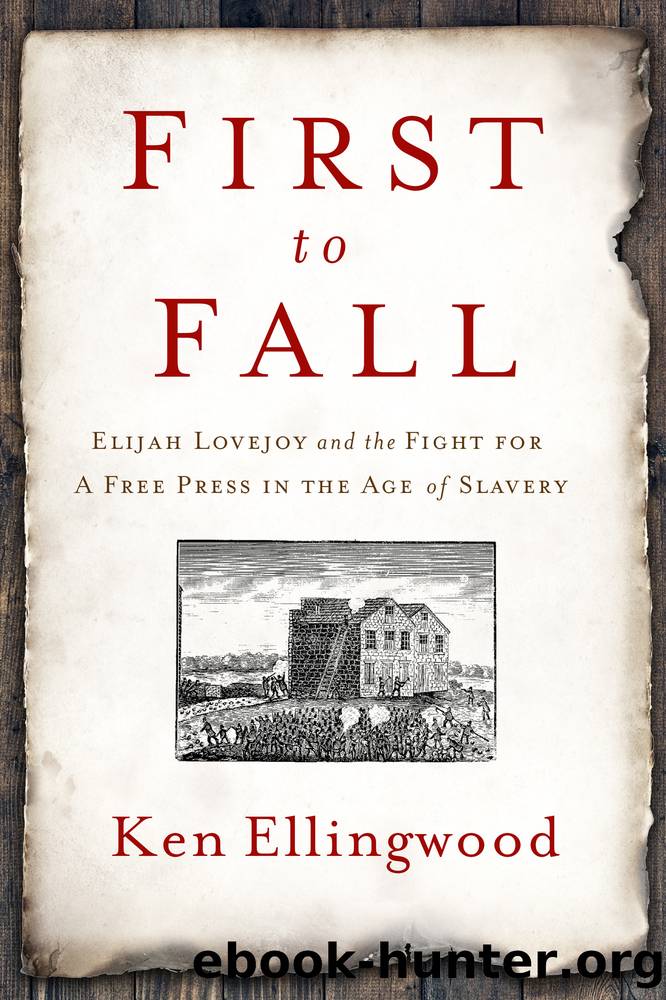First to Fall by Ken Ellingwood

Author:Ken Ellingwood
Language: eng
Format: epub
Publisher: Pegasus Books
Published: 2021-05-04T00:00:00+00:00
* * *
LOVEJOYâS REPLY CAME IN the form of two resounding blasts. One arrived on July 20, nine days after the Market House meeting aimed at getting him to desist. Lovejoy wrote and published a long, blistering column that occupied a hefty chunk of page 2, under the headline âWhat Are the Doctrines of Anti-Slavery Men?â If the editor had once denounced abolitionists as wild-eyed extremists, this piece of writing was unmistakable proof that he was now fully one of them. He fiercely defended the abolitionist position and the people who advocated it, arguing that abolitionists had been unfairly tarred by misrepresentations and untruths, including the shopworn charge that they were champions of amalgamation.
The case for abolition rested first and foremost, Lovejoy argued, on the belief that all men were created free and equal, a condition that was impossible to honor so long as any man was permitted to turn another into merchandiseââa âTHING,â a âCHATTEL,â an article of personal âPROPERTY.âââ American slavery was âa legalized system of inconceivable injustice, and a SIN,â Lovejoy wrote. He warned that the âpolitical evilâ represented by bondage was not merely a bane to the nationâs slaves. It threatened the wider society as well and would soon bring about âthe downfall of our free institutions, both civil and religious.â
Lovejoy also sought to turn the words of Southern politicians like Calhoun against the slavery cause they so ardently defended. Calhoun, in arguing about the former tariff issue years before, had declared that âhe who earns the moneyâwho digs it out of the earth with the sweat of his brow, has a just title to it against the Universe,â Lovejoy wrote. It was just such a libertyâthe right of a man to keep what he earnsâthat abolitionists were defending now. And because the Bible offered only one remedy for sinâto repent immediatelyâthe same held true for the sin of slavery. âAbolitionists believe that all who hold slaves, or who approve the practice in others, should immediately cease to do so,â the editor argued. Emancipation might spell economic harm to slave owners, but it would be as worthwhile as to deprive a rum seller of his profits, he said.
In this remarkable columnâpart self-criticism, part war cryâLovejoy was openly embracing a fiery approach that he had, not so long before, denounced as dangerous for the country. Gone were the weasel words of gradualism, the paternalistic concern for souls over the lived existences of breathing people. The time for half measures had passed. Lovejoy may not have directly applied the abolitionist label to himselfâhis detractors had done this for him, after allâbut the volcanic July 20 column was the closest he would come to a personal manifesto on the crime of slavery. His conversion to abolitionism was complete.
A second, more pressing matter still remained: the Market House groupâs ultimatum. The polite, almost deferential, tone of the committeeâs letter aside, there was no avoiding the question: would he stop publishing on slavery? Six days after his stunning âAnti-Slavery Menâ column hit the streets, Lovejoy put quill to paper again.
Download
This site does not store any files on its server. We only index and link to content provided by other sites. Please contact the content providers to delete copyright contents if any and email us, we'll remove relevant links or contents immediately.
Blood and Oil by Bradley Hope(1558)
Wandering in Strange Lands by Morgan Jerkins(1407)
Ambition and Desire: The Dangerous Life of Josephine Bonaparte by Kate Williams(1380)
Daniel Holmes: A Memoir From Malta's Prison: From a cage, on a rock, in a puddle... by Daniel Holmes(1324)
Twelve Caesars by Mary Beard(1310)
It Was All a Lie by Stuart Stevens;(1291)
The First Conspiracy by Brad Meltzer & Josh Mensch(1165)
What Really Happened: The Death of Hitler by Robert J. Hutchinson(1154)
London in the Twentieth Century by Jerry White(1141)
The Japanese by Christopher Harding(1129)
Time of the Magicians by Wolfram Eilenberger(1121)
Twilight of the Gods by Ian W. Toll(1110)
Cleopatra by Alberto Angela(1091)
A Woman by Sibilla Aleramo(1088)
Lenin: A Biography by Robert Service(1071)
John (Penguin Monarchs) by Nicholas Vincent(1062)
Reading for Life by Philip Davis(1023)
The Devil You Know by Charles M. Blow(1018)
The Life of William Faulkner by Carl Rollyson(976)
